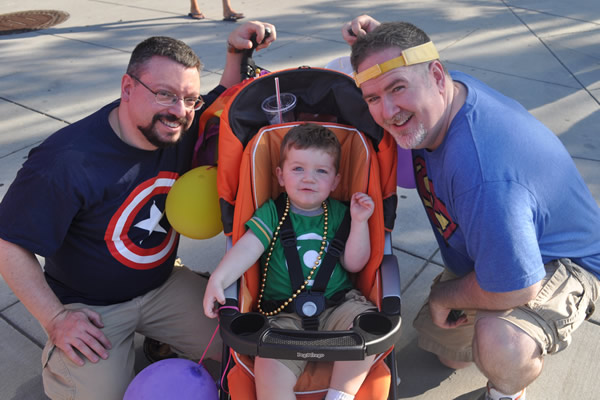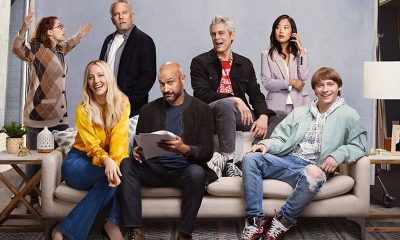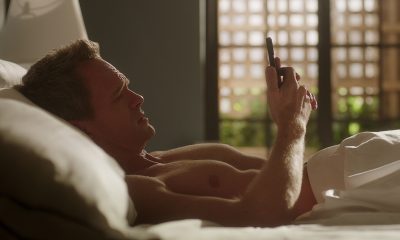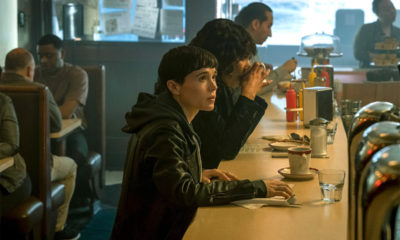Arts & Entertainment
‘Normal’ families?
Real-life gay parents weigh in on how they’re portrayed in pop culture
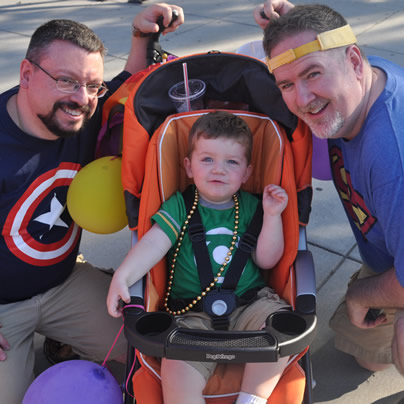
Gay characters have been on TV since the ‘70s with Billy Crystal on “Soap.” And we’re now seeing more LGBT family life than ever before, especially on sitcoms like “Modern Family” and “The New Normal.”
But these characters are written — as one would expect on a sitcom — broadly. How do they sit with real-life LGBT families? We found some in our area and asked.
“We get this question all the time,” says Brent Almond, a Kensington, Md., resident who’s raising nearly 3-year-old son Jon with his partner of 15 years, Nick Pirulli. “We adopted our son about the same time Cam and Mitch did on ‘Modern Family,’ plus we are a couple consisting of a larger southern guy and a smaller, bearded lawyer. We’ve been watching it from the beginning and love it. I think, you know, I don’t know that our personalities are too much like theirs, but they look like real people to us. The guys on ‘The New Normal’ are almost too pretty. I know people like that but they’re not really our friends. They don’t seem as quote-unquote real to me.”
Related stories:
Milestones in LGBT parenting history
Not everyone is feeling the warm fuzzies though. Alexandra Khalaf, who’s raising 9-month-old daughter Camille with her spouse of three years, Amy, says Hollywood’s fascination with gay men is disappointing.
“Of course I DVR’d ‘The New Normal’ hoping that any new gay show would be helpful for our cause,” she says. “But I find myself really frustrated watching the show. First, it’s always gay men on these shows, minus ‘The L Word,’ which was all straight women and horribly done. Second, the show of course portrays the very wealthy gay men living in a beautiful home in California, a stereotype for all gay men — good looking, fit, rich. Then he has a black ‘helper’ — again, stereotype. It’s not realistic at all.”
She’s also concerned at how easy the show made the parenting process appear.
“My wife and I went through so many things to have our daughter — lawyers office multiple times for documents that might help should be wife and I separate or God forbid die. We had to deliver in another state other than where we live in Virginia in order to both be on the birth certificate. It’s not like a puppy where you walk up to a window and say, ‘Awwww, honey I want that one.’ And then the surrogate just gets pregnant on the first try. Seriously? This show makes it look so easy for our community to just pop out a kid … if the shows can’t be real, then don’t bother putting it on.”
Steve Majors, who works as communications director for Family Equality Council and has two daughters — 8-year-old Claudia and 7-year-old Shoshana — with partner Todd Leavitt, says while some of those observations are good to keep in mind, these shows ultimately do more good than harm.
“I know many families who gather around these shows with bowls of popcorn and their kids and it’s important for these kids to see their lives reflected in pop culture,” he says. “We know that LGBT families live everywhere. We live in 96 percent of the counties in the U.S., in every state. We are friends and neighbors and church goers just like everyone else and so when you have these shows that identify LGBT families, it goes a long way to let other people, our friends, neighbors and community members, know we exist and we are out there.”
But while the representation is seen as good by many LGBT TV fans, could there be a backlash? One can almost imagine grumbling remarks in middle America with straight viewers saying, “Here we go again — you know they had to throw in a token gay character.”
Majors says no.
“What you’re seeing is the normalization of our families on TV and it’s just part of that process,” he says. “Yeah, you may have people think, ‘Oh, there goes our requisite LGBT character, but that’s all part of the part of us being in the pop culture conversation. It’s no longer something that’s seen as unique, edgy, controversial or cliché.”
Majors says pop culture is always a reflection of where society is in general.
“On ‘Will & Grace’ there was a lot of narrative about the search for a partner, a husband or a long-term spouse but we’re at a point now where more and more Americans support the freedom of LGBT people to get married and create families so as that has become more of a reality, it’s changing the narrative of how we see that reflected in films and TV. It’s not that unusual for there to be [LGBT] family storylines because that’s where we are right now as a community.”

Team DC, the umbrella organization for LGBTQ-friendly sports teams and leagues in the D.C. area, held its annual Night of Champions Awards Gala on Saturday, April 20 at the Hilton National Mall. The organization gave out scholarships to area LGBTQ student athletes as well as awards to the Different Drummers, Kelly Laczko of Duplex Diner, Stacy Smith of the Edmund Burke School, Bryan Frank of Triout, JC Adams of DCG Basketball and the DC Gay Flag Football League.
(Washington Blade photos by Michael Key)




















The 2024 National Cannabis Festival was held at the Fields at RFK Stadium on April 19-20.
(Washington Blade photos by Michael Key)
















Covering the @NatlCannaFest at RFK Stadium for @WashBlade . Stop by the LGBTQ+ booth and pick up a paper if you are here. pic.twitter.com/is7hnsaPns
— Michael Patrick Key (@MichaelKeyWB) April 20, 2024
Theater
‘Amm(i)gone’ explores family, queerness, and faith
A ‘fully autobiographical’ work from out artist Adil Mansoor

‘Amm(i)gone’
Thorough May 12
Woolly Mammoth Theatre
641 D St., N.W.
$60-$70
Woollymammoth.net
“Fully and utterly autobiographical.” That’s how Adil Mansoor describes “Amm(i)gone,” his one-man work currently playing at Woolly Mammoth Theatre.
Both created and performed by out artist Mansoor, it’s his story about inviting his Pakistani mother to translate Sophocles’s Greek tragedy “Antigone” into Urdu. Throughout the journey, there’s an exploration of family, queerness, and faith,as well as references to teachings from the Quran, and audio conversations with his Muslim mother.
Mansoor, 38, grew up in the suburbs of Chicago and is now based in Pittsburgh where he’s a busy theater maker. He’s also the founding member of Pittsburgh’s Hatch Arts Collective and the former artistic director of Dreams of Hope, an LGBTQ youth arts organization.
WASHINGTON BLADE: What spurred you to create “Amm(i)gone”?
ADIL MANSOOR: I was reading a translation of “Antigone” a few years back and found myself emotionally overwhelmed. A Theban princess buries her brother knowing it will cost her, her own life. It’s about a person for whom all aspirations are in the afterlife. And what does that do to the living when all of your hopes and dreams have to be reserved for the afterlife?
I found grant funding to pay my mom to do the translation. I wanted to engage in learning. I wanted to share theater but especially this ancient tragedy. My mother appreciated the characters were struggling between loving one another and their beliefs.
BLADE: Are you more director than actor?
MANSOOR: I’m primarily a director with an MFA in directing from Carnegie Mellon. I wrote, directed, and performed in this show, and had been working on it for four years. I’ve done different versions including Zoom. Woolly’s is a new production with the same team who’ve been involved since the beginning.
I love solo performance. I’ve produced and now teach solo performance and believe in its power. And I definitely lean toward “performance” and I haven’t “acted” since I was in college. I feel good on stage. I was a tour guide and do a lot of public speaking. I enjoy the attention.
BLADE: Describe your mom.
MANSOOR: My mom is a wonderfully devout Muslim, single mother, social worker who discovered my queerness on Google. And she prays for me.
She and I are similar, the way we look at things, the way we laugh. But different too. And those are among the questions I ask in this show. Our relationship is both beautiful and complicated.
BLADE: So, you weren’t exactly hiding your sexuality?
MANSOOR: In my mid-20s, I took time to talk with friends about our being queer with relation to our careers. My sexuality is essential to the work. As the artistic director at Dreams of Hope, part of the work was to model what it means to be public. If I’m in a room with queer and trans teenagers, part of what I’m doing is modeling queer adulthood. The way they see me in the world is part of what I’m putting out there. And I want that to be expansive and full.
So much of my work involves fundraising and being a face in schools. Being out is about making safe space for queer young folks.
BLADE: Have you encountered much Islamophobia?
MANSOOR: When 9/11 happened, I was a sophomore in high school, so yes. I faced a lot then and now. I’ve been egged on the street in the last four months. I see it in the classroom. It shows up in all sorts of ways.
BLADE: What prompted you to lead your creative life in Pittsburgh?
MANSOOR: I’ve been here for 14 years. I breathe with ease in Pittsburgh. The hills and the valleys and the rust of the city do something to me. It’s beautiful, it’ affordable, and there is support for local artists. There’s a lot of opportunity.
Still, the plan was to move to New York in September of 2020 but that was cancelled. Then the pandemic showed me that I could live in Pittsburgh and still have a nationally viable career.
BLADE: What are you trying to achieve with “Amm(i)gone”?
MANSOOR: What I’m sharing in the show is so very specific but I hear people from other backgrounds say I totally see my mom in that. My partner is Catholic and we share so much in relation to this.
I hope the work is embracing the fullness of queerness and how means so many things. And I hope the show makes audiences want to call their parents or squeeze their partners.
-

 South America4 days ago
South America4 days agoDaniel Zamudio murderer’s parole request denied
-

 Maryland5 days ago
Maryland5 days agoMontgomery County police chief discusses arrest of trans student charged with planned school shooting
-

 State Department22 hours ago
State Department22 hours agoState Department releases annual human rights report
-

 Theater4 days ago
Theater4 days ago‘Amm(i)gone’ explores family, queerness, and faith

